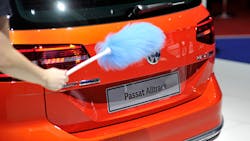Volkswagen AG told its dealers that the automaker is still committed to a mass-market strategy in the U.S. and has doubled production of an all-wheel-drive station wagon to challenge the Japanese automaker Subaru beginning the fourth quarter of 2016.
Herbert Diess, global head of the Volkswagen brand, and Hinrich Woebcken, interim chief executive of the company’s U.S. sales unit, met with the dealers on Saturday for 90 minutes during a convention in Las Vegas.
“We are working to redefine the Volkswagen brand in the United States by strengthening our management team, our partnerships with dealers, and our product portfolio,” Diess told reporters after the meeting. “We want to grow the volume consistently beyond past levels, and we will do this with our partners, the dealers. More than ever, we will include their ideas and their requirements into our decision-making.”
“If there’s going to be a redefinition, it’s going to be price-competitive German engineering,’’ said Michael DiFeo, the dealer principal at Linden Volkswagen in New Jersey, who attended Saturday’s meeting.
Volkswagen is trying to stem discontent among its retailers as the German automaker negotiates with regulators about the fate of about 600,000 diesel vehicles in the U.S. that were rigged to cheat on emissions tests. Volkswagen also faces hundreds of private lawsuits. Last week, U.S. District Judge Charles Breyer in San Francisco ordered the carmaker to come up with a detailed proposal by April 21 to get the over-polluting vehicles off the road.
At Saturday’s meeting, the two sides didn’t talk about how actually to fix the cars or compensate customers, since Breyer had asked the company not to disclose details of talks with regulators.
“We have to see some action,” said Michelle Krebs, an analyst at Autotrader.com. “They keep talking about where they want to be with sales, but there’s still no plan for taking care of the customers they have, and to win back the customers they’re losing.”
On Friday, many of Volkswagen’s 652 U.S. dealers met and selected a five-member committee to negotiate with the automaker. Their goal will be to seek compensation for losses stemming from the emission scandal, without resorting to lawsuits.
“The dealer body is unified that it’s not in our best interest to take a litigation posture,’’ said Jason Kuhn, chairman of the Kuhn Automotive Group in Tampa, Florida. “These are going to be our partners not only now but for a long time to come.”
VW needs to make its dealers whole for financial losses suffered during the emissions crisis because they’ll be the cornerstone of whatever actions the company undertakes to rekindle loyalty among its customers, Kuhn said. Negotiations between Volkswagen and its U.S. dealers will begin as soon as meetings can be arranged, he said.
Volkswagen’s namesake brand sold 349,440 cars and light trucks in the U.S. last year. In a press conference after Saturday’s meeting, Alan Brown, chairman of VW’s National Dealer Advisory Council and co-owner of two Volkswagen stores in suburban Dallas, said the company needed to sell as many as 500,000 cars a year for Volkswagen and its dealers to make an acceptable profit.
Less than a decade ago, the automaker had hopes of selling about 800,000 VW-brand vehicles in the U.S. by 2018. Based in part on that plan, Volkswagen dealers have invested $1 billion to upgrade their stores. Even if the 800,000 annual sales target is no longer feasible, Brown has said, he would pressure the company not to become a niche manufacturer reliant on premium prices.
Ambitious Growth Plans Still in Place
“I just don’t know how they’re going to get to 500,000,’’ Krebs said. “They’re in a big hole, and now the market is plateauing.’’
Sales of Volkswagen-branded cars and trucks slumped 10.4% in the U.S. in March, to 26,914. This decline occurred even though the Volkswagen group, including Audi, boosted rebates and other discounts by 20% to $3,589 per vehicle, or $479 more than the industry-wide average, according to Autodata Corp.
During meetings at Volkswagen’s Wolfsburg, Germany, headquarters in mid-March, the company agreed to build a sport utility vehicle that would be bigger than a Jeep Grand Cherokee, Brown has said.
Dealers also want a compact SUV that would be smaller than the current Tiguan, Brown said after the March meetings. And they want lower prices on cars such as the Passat family sedan, which now costs about $4,000 more than comparably equipped cars like the Toyota Camry. Last year in the U.S., VW sold about 78,000 Passats and Toyota sold 429,000 Camrys.
Steve Kalafer, chairman of Flemington Car & Truck Country near Trenton, New Jersey, said in an interview before the Saturday meeting that talking about sales goals and future products now is almost a distraction. Volkswagen still hasn’t told customers and dealers how they’ll be compensated for the diesel scandal, and hasn’t reassured employees that they have a future with the company, he said.
“The fraud is what has to be dealt with,’’ Kalafer said. “I want to know what our customers will receive and when will they receive it. I want to know what Volkswagen will do to make whole these dealers who’ve invested billions in their facilities – at the company’s direction.
“These are simple questions. The answers are black and white. They’re only gray when you’re calculating how much they’re going to cost you.’’
When asked about the possibility of dealer lawsuits, Diess said, “We had a very positive atmosphere and this was not an issue.”
By John Lippert
About the Author
Bloomberg
Licensed content from Bloomberg, copyright 2016.
